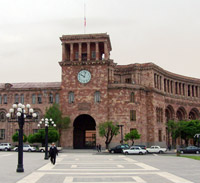Today it is clear that during the upcoming presidential elections the choice will not be between electing personalities, but between public administration models. In other words, the society will have to give answer to one question only, which is whether they want to live in the existing conditions or they want drastic changes.
Generally, is there any model of state governance in Armenia? Certainly there is. If we try not to use the classic definitions (“democratic”, “authoritarian”, etc.) and define a new term for Armenia, definitely the most appropriate term will be “homey”. Yes, the state governance model of Armenia is “homey”. Here all issues are solved in “homey” conditions. Such issues are for example building houses, getting a driving license, etc. Even they are told with smiling faces that “laws don’t matter” and ask whether they don’t know how problems are solved in Armenia. In fact it turns out that everyone knows this. I don’t mean corruption only. Really everything is “homey” in Armenia. For instance, you take a minibus in “homey” conditions, later in such conditions you try to find a place in it where you can at least stand, later you make a “homey” hint at the driver so that he lets you get off his vehicle in the middle of the road, and he behaves himself very “homey” and lets you do that. There is no corruption in such case; just it is convenient to both of them. This is the “homey” version how our state is governed too. The ex FM was arrested in “homey” conditions, and was released in such “homey” conditions too…
Many people may think that this model of state management is really convenient since everyone knows the rules, i.e. everyone knows how much they have to pay for solving certain problems, and whom to pay that money, etc. At first glance it may seem to people that this model is convenient for those people, who are able to pay and solve problems in such “homey” conditions. We wander whether this is really true.
The problem is that even in the most corrupted and despotic countries there are rules (written or unwritten), which are binding even upon the despots and even they cannot break such rules.
For instance, in ottoman Turkey the sultan had unlimited power, but the law prohibited him convict more than 14 persons to death a day. However, there are no limits in Armenia. We don’t mean execution. For instance, it is established that within the “homey” model of governance in order to have a good business you have to violate elections in favor of the authorities. However, it turns out that this is not an absolute and unbreakable rule. It may happen that the leaders of the country may get angry and take that business. Meanwhile, there is no rule constituting exact terms about when the authorities may get angry and take businesses.
In other words, the “homey” model of public administration is not good even for the ones that are able to solve many problems in “homey” conditions. It is not good since it is unpredictable. For instance, it seems to a high rank official that he/she has done everything in a due manner, has take certain bribe, has kept a part of it and has given the other part to whom he/she had to give it, but one day he/she may come to the office and see that he/she has been fired. Did he fail? No, it is just absurd.
In a word, the existing “homey” model is not good for anyone. Either we have to legally approve and adopt all the unwritten rules, i.e. how much bribe we can give or take, and for which services we can take or give bribes, or just come to a general agreement that we will follow the Constitution and will not break the law any more. Certainly, the second version is hardly possible; however, the fact is that this “homey” model is becoming unbearable. The governance model should be changed. This should be done through the upcoming presidential elections.

